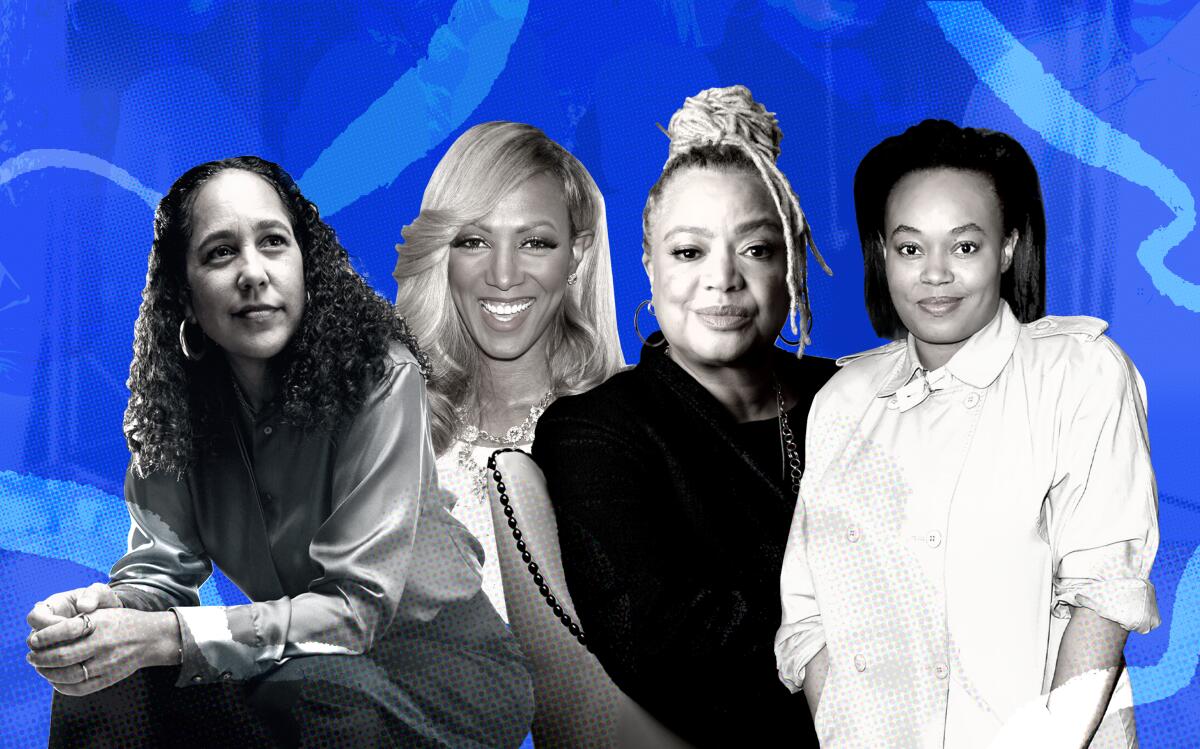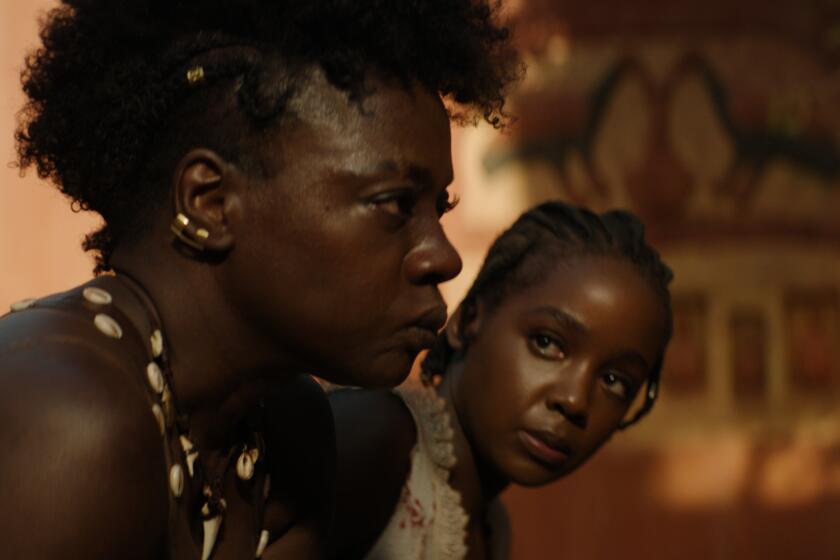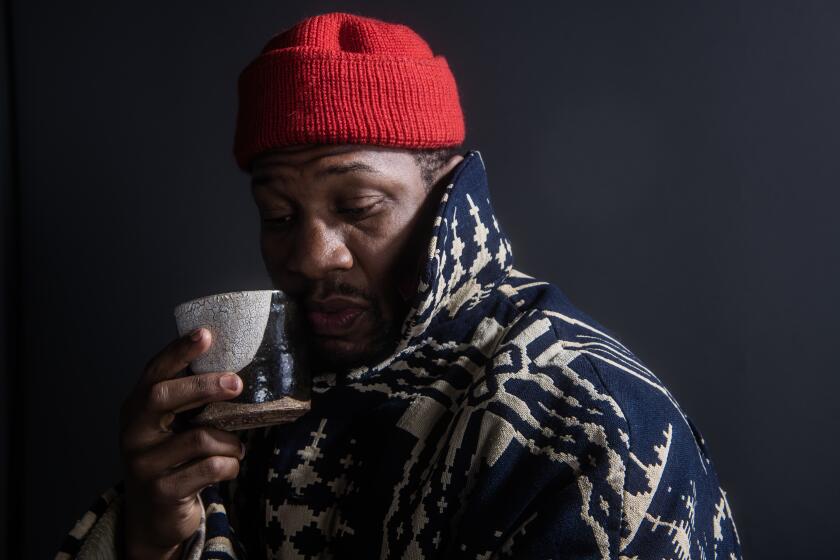Hollywood can be toxic to Black women. This L.A. film festival is the ‘antidote’

- Share via
“The Woman King” thrilled audiences when it premiered last year. The spectacle starring Viola Davis demonstrated director Gina Prince-Bythewood’s mastery of character-driven storytelling and epic battle scenes alike. Many awards-season observers felt she should have scored an Oscar nomination.
Though Prince-Bythewood has cemented her status as one of the industry’s most reliable filmmakers, she has not forgotten the near-catastrophe she encountered at the beginning of her career when she was a UCLA film student running out of money and time.
Lacking the resources to complete her thesis film, about a comedian using humor to cope with her trauma-filled past, she reached out, desperate, to Sandra Evers-Manly, then the head of the Beverly Hills chapter of the NAACP and an advocate for aspiring Black filmmakers.
“I was B.R.O.K.E. and just cold-called Sandra,” said Prince-Bythewood. “She didn’t know me, and I just asked if she had any connections that could help me. That was all it took. Before I knew it, I got all my processing taken care of for free. That meant everything.”
“Stitches” screened shortly afterward at Manly’s Sistas Are Doin’ It for Themselves film festival. The experience was a launchpad for Prince-Bythewood, whose impressive résumé also includes “Love & Basketball,” “The Secret Life of Bees” and Netflix’s superhero saga “The Old Guard.” She will be a producer for the planned sequel of that film.
Prince-Bythewood’s rise is one of the most triumphant results of the Sistas Are Doin’ It for Themselves Short Film Showcase, which celebrates its 30th anniversary this weekend, kicking off with a gala opening Friday at the Directors Guild of America. With a title that puts a cultural spin on the Eurythmics’ anthem “Sisters Are Doin’ It for Themselves,” the three-day event, which is sponsored by the Black Hollywood Education and Resource Center, will honor aspiring and veteran Black women filmmakers.
From critics groups to the guilds to the Academy Awards, Hollywood’s highest honors continue to overlook Black women — eight years after #OscarsSoWhite.
“That festival was such a cool, supportive environment, and I’ve never forgotten it,” said Prince-Bythewood. “The beauty of the festival is that young people can put everything they have into their film, knowing there is a platform where it can be seen. And the filmmaking gets better every year.”
Other filmmakers who credit the showcase for helping them get a valuable start on their careers include Kasi Lemmons (“Harriet”), Numa Perrier (“Jezebel”) and Princess Monique (“The Goldbergs,” “black-ish”).
Prince-Bythewood recalls being blown away at the festival when Lemmons debuted a short film that eventually became the basis of her 1997 breakthrough feature, “Eve’s Bayou,” starring Samuel L. Jackson and Jurnee Smollett: “It was brilliant and so beautifully shot.”
Those success stories have filled Manly with pride while reinforcing her commitment to increasing opportunities for Black women directors.
“I truly believe that what we’re doing has had an impact on Hollywood,” she said last week while making preparations for the opening night of the showcase, which will feature Debbie Allen (“Grey’s Anatomy”) and Wendy Raquel Robinson (“The Game”).
Her allies include Dianne Houston, the only Black woman ever to receive an Oscar nomination for directing. (The nod was for her 1995 short film, “Tuesday Morning Ride.”) Houston, who has written and directed episodes of “Empire” and other series, called the showcase “an antidote to the toxicity of Hollywood.”
The first festival had 17 submissions. For this year’s showcase, more than 1,100 shorts from as far away as South Africa were submitted for consideration.
“So many of the films that are being submitted now have to do with things that are going on the news that affect the Black community,” Manly said. “We’re seeing narratives about police brutality and mental health. There are concerns about missing Black women in communities.”
Genres and forms represented in the festival range from science fiction to experimental films to documentaries. Said Manly, “There is nothing that is off-limits, and we see everything.”
Perrier, who directed the upcoming Netflix romantic comedy “The Perfect Find” starring Gabrielle Union, said she felt a career in Hollywood was out of reach when she first attended the showcase more than 15 years ago. She just knew she loved making small experimental films.
“I had felt so alone, like I was walking in a dark tunnel,” Perrier said in an interview last week. “I didn’t feel there was a pathway for me when it came to Hollywood. I was just passionate about making my films and having them seen by people who mean the most. I just wanted to build a community with other filmmakers.”
She recalled being awed by a short film by Dee Rees that would eventually serve as the foundation for “Pariah,” Rees’ acclaimed 2011 film about a teenager coming to terms with her identity as a lesbian.
“I just wanted to know everyone affiliated with it,” Perrier said. “I just knew I wanted to make something that would have the same impact as that one. That’s what the showcase does — create this spirit of healthy competition.”
A few years later, Perrier submitted her short film titled “Judi: A Series of Memories.” “It was about the death of my adopted mother and me taking care of her while dealing with [Type 1] diabetes,” she said. “It was a subject that many in the audience could relate to because so many of us knew or took care of someone dealing with that.”
News Analysis: What Jonathan Majors’ dramatic rise and fall says about race and justice in Hollywood
The actor, who this week faces his first court date in a domestic dispute, may suffer more career damage than his Hollywood counterparts do. Is race a factor?
Perrier was overwhelmed by the reaction following the screening: “It was like the air went out of the room. I saw the collective power of people watching a film at the same time, the power of healing and unity. I didn’t want to let that power go.”
Perrier would go on to write and direct a film about her days as an internet sex cam girl, “Jezebel,” which drew a positive response from critics when it premiered at the 2019 SXSW Film Festival. Her new film, “The Perfect Find,” is scheduled to premiere at the Tribeca Festival in June before debuting on Netflix.
“It’s my love letter to rom-coms,” said Perrier about the film, which features Union as a fashion journalist who becomes involved with a much younger man who happens to be the son of her boss. And even though the film is more mainstream than her previous projects, “I still got to bring a little bit of experimental style to it. I will always be at heart an independent filmmaker.”
Monique said getting accepted into the showcase during her early 20s with her short film “The Call” was key in helping her decide she should pursue directing rather than acting. The project focused on a young woman waiting for a fateful phone call about whether she had contracted HIV from her boyfriend, who was a football player.
“I realized that I wanted to make content that would not only entertain but deal with real issues,” she said. “It was about Black women supporting each other’s work. It helped show me my purpose in life.”
Though excited by the growth of the showcase, Manly said her work is not finished, and that Black female directors still face daunting obstacles: “Getting visibility and representation is still a huge issue. So we will continue the effort. We have a lot of work to do.”
More to Read
Only good movies
Get the Indie Focus newsletter, Mark Olsen's weekly guide to the world of cinema.
You may occasionally receive promotional content from the Los Angeles Times.













